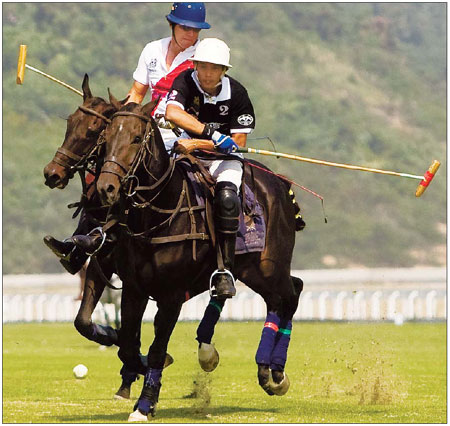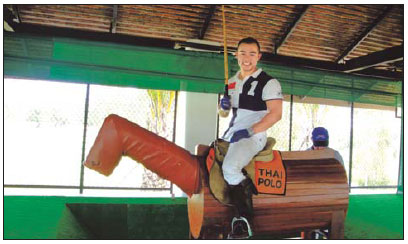Life and Leisure
Polo on a charge
By Xu Junqian (China Daily)
Updated: 2010-12-20 07:54
 |
Large Medium Small |
|
Nine Dragon Hill Polo Club hosts polo games every month, in Pinghu, Zhejiang province. Xu Xiaolin / China Photo Press |
|
Shanghai's Shi Weirong practices playing polo three times a week, in Pinghu. Provided to China Daily |
Dubbed the 'game of kings' polo is fast making a comeback in China as the game of the newly rich. Xu Junqian reports
November is not exactly a good season to play polo. Horses become slower, players stiffer and chilly winds keep spectators indoors. But on a vast, perfectly manicured lawn fronting the sea and ringed by lush mountains in Zhejiang's little known city of Pinghu, a polo match is about to kick off, amid rolling drums, neighing horses, and thousands of excited spectators.
Eight gentlemen, in uniform shirts, tight white pants and tall leather boots, gracefully mounted on robust ponies, grab T-shaped mallets and line up in two teams of four.
At the blow of a whistle, the riders, like arrows from a bowstring, gallop away, swinging their mallets after a tiny white ball, to score their goals. The triumphant cheers of the spectators are submerged in the thunder of hooves. It is quick and intense: seven minutes a chukka, or game.
Back in the white tents stretching miles from the field, a spirit of celebration permeates the crowded space, where handsome valets, dressed like Ralph Lauren models, serve bubbling champagne and sizzling roasts, and ladies in exquisite gowns and elaborate hats cheer their husbands and sons, from tables covered in velvet drapes and scattered with poker cards.
The celebration is not only for the winners, but also for the return of the king of sports, polo, to China, where it has had a long and distinguished past.
It is not the first time a polo match has been held at this remote village. Games have been held every month since British-born Steve Wyatt and his Chinese wife, Hua Huicong, an avid polo playing couple, founded Nine Dragon Hill Polo Club, named after its location, four years ago.
The pull of polo is becoming ever stronger, drawing the affluent from all over China to be a part of this most exclusive sport by paying a membership fee of at least 500,000 yuan ($75,000) to the club, the nation's first and best-known.
Built in 2006, on the couple's first trip back to China, the club now has two international-standard polo fields, 200 ponies imported from Argentina, 160 stables and a total area of 5,000 square meters.
"We had anticipated no more than three members in the first year, and maybe another five in the second," says Hua, who founded the club with her husband only to feed their own cravings for the sport.
"But the demand for membership far exceeded our expectations. Around 200 people showed up on the club's opening, mostly businessmen from nearby Shanghai and Hangzhou. Some were driven by investment considerations," Hua says.
While that expectation is yet to be realized, the couple's "careless decision", an investment of 200 million yuan ($30 million), has built enough interest among the country's potential polo aficionados, with the club's membership currently standing at 500.
"It just feels like playing golf on horseback in an earthquake. And I promise, once you try it, you will get hooked," declares Shi Weirong, a Shanghai native and winner of the Best Polo Beginner in a 2010 national championship.
The 29-year-old started playing polo two years ago after joining a program started by the Wyatts, dubbed "Zero to Hero".
Shi, a senior executive of a private automotive trim company, says that polo has become such a major part of his life that he drives all the way from Shanghai to Pinghu in his BMW7 three times a week, to practice.
The annul fee of 500,000 yuan, Shi believes, is not enough to help him become a professional.
But for the majority of the club's members, polo, with its long-standing image as a classy pursuit of British royals, is more a tool of social contact than a serious sport.
"The 500,000-yuan membership fee is just a threshold to block out unwanted entry into this exclusive circle, so that members can enjoy a private space to make new friends and business partners," Hua says.
Despite all the glamour of the sport, Hua tells China Daily it is an unrewarding business for the investor.
But the shrewd couple have made it.
Their secret sounds simple enough: gather the rich and big brand names in the same room in the name of a polo match. The rich shop while also playing polo, the sponsors get their publicity and also sell their products; and the club makes money from both sides.
The sponsors typically include some of the biggest names in corporations and real estate. According to Hua, sponsorships have brought in 150 million yuan in the past three years; some 30 property developers have also approached the Nine Dragon Club with investment ideas.
Encouraged, Hua is now hatching plans for a second clubhouse in the suburbs of Shanghai, and an expansion of the Pinghu site.
Success has drawn others. In Tianjin, an exclusive polo club opened at the city's landmark building, Goldin Metropolitan Hotel, a 117-story luxury compound in November. And in Beijing, a similar one covering an area of 153,000 square meters was built two years ago.
Hua appears more than happy with these developments, saying the industry still has plenty of room for others. Numbers from the Chinese Equestrian Association support Hua's optimism, and say the value of equestrian sports will exceed 100 billion yuan ($15 billion) in decades, and of these polo is the most promising.

